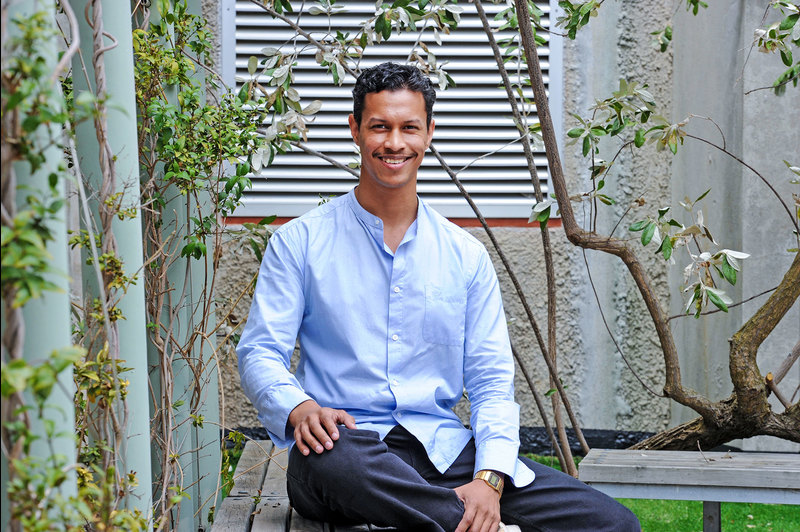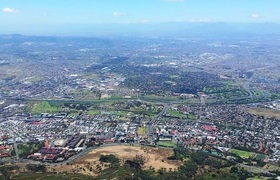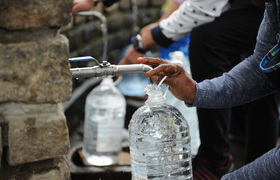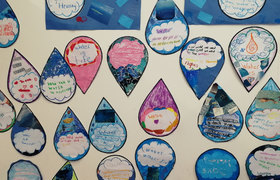Winning project reimagines Delft stormwater basin
10 November 2022 | Story Helen Swingler. Photo Lerato Maduna. Voice Cwenga Koyana. Read time 7 min.
University of Cape Town (UCT) student Tauhir Rakiep has won the Best Student/Research Project category of the inaugural #cocreate Blue-Green Cities Design Awards for his proposal to convert a Delft stormwater basin into a bioretention pond and a valuable natural public amenity, a blue-green oasis in a densely built setting.
Now a master’s student in the School of Architecture, Rakiep’s winning “Knowing Water” project was completed during his honours year.
The winners in three categories were announced at the conclusion of this year’s #cocreateDESIGN FESTIVAL. The theme was “Designing African blue-green cities for all”. The festival is a Mission Network of the Kingdom of the Netherlands in South Africa initiative.
It was organised in collaboration with the Craft and Design Institute and curated in partnership with UCT’s Future Water Institute, the City of Cape Town and the Institute for Landscape Architecture in South Africa. Judges included Professor Neil Armitage of UCT’s Department of Civil Engineering.
The categories were: Community-Based Project, Best Use of Water as a Design Informant and Best Student/Research Project. The 10 shortlisted candidates ranged from community volunteers and students to professionals in fields such as civil and environmental engineering, architecture, landscape architecture, urban design, and conservation.
UCT civil engineering students Craig Tanyanyiwa and Rachelle de Charmoy’s project, “Pathways to water-resilient South African cities”, was also shortlisted.
The awards were conceptualised to celebrate inspirational initiatives that represent best practice in terms of water-sensitive design and the transition to water-sensitive cities in South Africa, and the event was livestreamed to water-aware design practitioners and other stakeholders around the world.
Associate Professor Kirsty Carden of UCT’s Future Water Institute emphasised the importance of this type of initiative in raising awareness about the need for blue-green city designs that showcase sustainability, liveability, resilience and productivity.
Understanding water
Rakiep’s winning project proposes converting a Delft stormwater basin into a bioretention pond to trap debris and smaller pollutants in incoming stormwater and “uses time” to purify the water. The design also creates a valuable natural public amenity: an oasis that offers sanctuary away from the busy Delft Main Road and in the dense built fabric.
“Understanding water, socially, has allowed me to design spaces where people witness water as a valuable resource but also as moments of reprieve and leisure,” said Rakiep.
The award is very welcome, although that was not the motivator, he said.
“I have never worked towards receiving awards, recognition or public merit for the work that I do. I have always looked for ways to contribute positively, and if the contribution was not recognised, that would be okay. However, this award is absolutely validating to me as a student. It’s proven to me that there is merit and relevance in the work that I have done and I am honoured to have been able to receive recognition for it.”
Rakiep’s design weaves the needs of nature and society together.
“[It’s] a commons where families and friends, young and old, can come together and share knowledge.”
“[It’s] a commons where families and friends, young and old, can come together and share knowledge passively through observation or informally through storytelling,” he explained. “The natural public amenity becomes a space that changes the perception of an attitude of indifference towards water to that of a vital resource.”
The postgraduate student from Strandfontein Village said he draws inspiration from this coastal village, which still bears the hallmarks of apartheid spatial planning.
“As a result, many areas on the coastline are disconnected from resources on their doorstep. One of those resources is the ocean. Sustainable aquaculture farming, the farming of marine organisms, has many benefits that include empowering these coastal communities by creating job opportunities and diversifying our food sources. Saldanha Bay is one example of the benefits of aquaculture farming in the Western Cape.”
But the water and social connection does not have to be at this scale, Rakiep noted.
“Access to the coast, being able to walk safely to the close-by beach in the hot summers is important for the public health of our communities.”
His “Knowing Water” project reflects this focus in his work.
Understanding the way water works physically has also guided Rakiep in finding ways to create buildings that are water-sensitive, resilient and contribute positively to water management systems.
Replicable research and design
Day Zero, when the City of Cape Town’s taps were expected to run dry, was an awakening for him.
“Having experienced our first Day Zero in 2017 was scary. The fear of that happening again motivates my research.”
He hopes that his research will be replicable across other areas of water stewardship and the needs of communities.
Are we doing enough as a society, and as educators, policymakers, consumers, and scientists to protect water? Rakiep believes that there is a strong drive to turn things around in an increasingly warming world.
“The support and participation from the City of Cape Town, The Future Water Institute, Cape Design Institute in the #cocreateDESIGN FESTIVAL has shown me that we are taking active steps toward responding to and addressing current climate conditions.
“The festival has also shown me the vast network of disciplines that are focused on creating climate- sensitive initiatives, which is testament to the awareness of the problem and the willingness to aid and find solutions.”
The role of the designer within this network is to be the connector of the various disciplines that will contribute to a systemic approach to climatic resilience, Rakiep said.
“The designer, I believe, will ensure that future projects are multifunctional and that they perform across scales. Functions that are sustainable on the environmental scale but inclusive of the human, societal scale.”
More winners
Winner in the Community-Based Project category was Indawo Abantu, Injongo eKhayelitsha, located in the Griffiths Mxenge community.
In the category Best Use of Water as a Design Informant the winner was the water point upgrade project at Europe informal settlement near Cape Town International Airport by an interdisciplinary team, all members of the Rotary Club of Noon Gun.
Associate Professor Carden said, “The #cocreate Blue-Green Cities Design Awards have provided a wonderful opportunity to reflect on best practice in creating water-sensitive, liveable and resilient spaces in South Africa – and give us hope for better things to come.”
 This work is licensed under a Creative Commons Attribution-NoDerivatives 4.0 International License.
This work is licensed under a Creative Commons Attribution-NoDerivatives 4.0 International License.
Please view the republishing articles page for more information.










